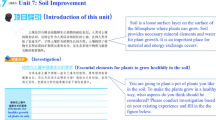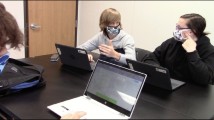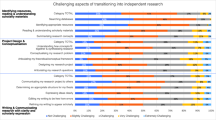Abstract
A growing body of research suggests that “high-impact practices” such as project-based and experiential learning make important contributions to undergraduate student development and outcomes. However, most attempts to evaluate such programs are based on qualitative or self-reported data generated from small samples. This study examines the impact on student development of a large university program that incorporates project-based learning into applied, vertically integrated, interdisciplinary research teams. We deploy a range of evidence, including self-reported assessments with a comparison group, a matched-pairs analysis of educational outcomes, participant surveys, and an alumni survey. By including a counterfactual comparison, our study demonstrates that applied projects can foster intellectual growth and positive academic outcomes among undergraduate students by: (1) contributing to skill development in relation to research, teamwork, and critical thinking; (2) developing closer relationships among students, faculty, and others within the university; (3) increasing the likelihood that a student graduates with distinction; and (4) contributing to career discernment that shapes students’ post-graduate trajectories, often predisposing students toward careers in public service. We comment on the most important factors for faculty and universities seeking to replicate this model: an emphasis on team organization and operations; the opportunity for students to develop close relationships aided by layered mentoring; and applied research. We also lay out the case for developing a general structure of evaluation for such programs to facilitate comparisons across educational contexts.


Similar content being viewed by others
Data availability
The data can be accessed by contacting the corresponding author.
Notes
Teams often run for multiple years, with a rotating set of student participants.
Resources for teams can be accessed at: https://bassconnections.duke.edu/fac-team-resources/tools-for-success
Additional undergraduate student participants joined teams throughout the year but did not receive the pre-participation survey based on the timing.
103 of 858; data based on email records on file, an unknown proportion of which are likely inactive.
On a 10-point scale, where 10 = strongly agree, the average response for undergraduates was 7.1, indicating an overall favorable reflection of the program.
Threshold for statistical significance is p < .05.
Average response rate across all years for all seniors is 58%.
Threshold for statistical significance is p < .05.
Senior survey response rate was 63% for all students (n = 1077) and 63% for Bass Connections participants (n = 216).
The Family Educational Rights and Privacy Act (FERPA) precludes us from reporting similar results comparing Bass Connections students to their matched pairs.
Fifty-six percent of undergraduate alumni are currently in graduate school.
Among teams that do have an external partner, individuals on teams that have established very close links with their partner and work hand-in-hand with them have higher satisfaction levels than individuals on teams with weaker relationships.
Among teams undertaking fieldwork, individuals working abroad express greater satisfaction than those conducting research domestically.
p < .001.
On a four-point scale where 3 is a moderate improvement and 4 is a great improvement, the average response is 3.23 (n = 452, st. dev = 0.9).
Faculty reported that Bass Connections teams played an important role in securing 40 grants totalling $19.8 M, a 521% return on investment on the funding provided to responding teams.
Half of the 97 faculty survey respondents reported at least one publication resulting from their team, with many noting multiple publications.
References
Amador, J. A., & Miles, L. (2016). Live from Boone Lake: Interdisciplinary problem-based learning meets public science writing. Journal of College Science Teaching, 45(6), 36–42.
Balemen, N., & Keskin, M. Ö. (2018). The effectiveness of project-based learning on science education: A meta-analysis search. International Online Journal of Education and Teaching, 5(4), 849–865.
Barkley, E. F., Cross, K. P., & Major, C. H. (2014). Collaborative learning techniques: A handbook for college faculty. Jossey-Bass.
Bhattacharyya, P., Chan, C. W.M., & Waraczynski, M. (2018). How novice researchers see themselves grow. International Journal for the Scholarship of Teaching and Learning, 12(2), Article 3. https://doi.org/10.20429/ijsotl.2018.120203
Blumenfeld, P. C., Soloway, E., Marx, R. W., Krajcik, J. S., Guzdial, M., & Palincsar, A. (1991). Motivating project-based learning: Sustaining the doing, supporting the learning. Educational Psychologist, 26(3–4), 369–398. https://doi.org/10.1080/00461520.1991.9653139
Chen, C. H., & Yang, Y. C. (2019). Revisiting the effects of project-based learning on students’ academic achievement: A meta-analysis investigating moderators. Educational Research Review, 26(1), 71–81. https://doi.org/10.1016/j.edurev.2018.11.001
Davis, S. N., Mahatmya, D., Garner, P. W., & Jones, R. M. (2015). Mentoring undergraduate scholars: A pathway to interdisciplinary research? Mentoring & Tutoring: Partnership in Learning, 23(5), 427–440. https://doi.org/10.1080/13611267.2015.1126166
Davis, S. N., & Jones, R. (2020). The genesis, evolution, and influence of undergraduate research mentoring relationships. International Journal for the Scholarship of Teaching and Learning, 14(1), Article 6. https://doi.org/10.20429/ijsotl.2020.140106
Garvin, M. R., & Ramsier, R. D. (2003). Experiential learning at the university level: A US case study. Education & Training, 45(4), 280–285. https://doi.org/10.1108/00400910310484349
Gershenfeld, S. (2014). A review of undergraduate mentoring programs. Review of Educational Research, 84(3), 365–391.
Goodrow, B., & Meyers, P. (2000). The Del Rio project: A case for community-campus partnership. Education for Health, 13(2), 213–220.
Guo, P., Saab, N., Post, L. S., & Admiraal, W. (2020). A review of project-based learning in higher education: Student outcomes and measures. International Journal of Educational Research, 102, 101586. https://doi.org/10.1016/j.ijer.2020.101586
Hart, J. (2019). Interdisciplinary project-based learning as a means of developing employability skills in undergraduate science degree programs. Journal of Teaching and Learning for Graduate Employability, 10(2), 50–66.
Helle, L., Tynjälä, P., & Olkinuora, E. (2006). Project-based learning in post-secondary education – theory, practice and rubber sling shots. Higher Education, 51, 287–314. https://doi.org/10.1007/s10734-004-6386-5
Howes, L., & Balleisen, E (2022). Research methods and creative outputs from interdisciplinary teams. Methodspace. https://www.methodspace.com/blog/research-methods-and-creative-outputs-from-interdisciplinary-teams. Accessed 20 Dec 2022
Kuh, G. D. (2008). High-impact educational practices: What they are, who has access to them, and why they matter. Association of American Colleges and Universities.
Nowell, L., Dhingra, S., Andrews, K., Gospodinov, J., Liu, C., & K, A. H. (2020). Grand challenges as educational innovations in higher education: A scoping review of the literature. Education Research International. 6653575. https://doi.org/10.1155/2020/6653575
Ralph, R. (2016). Post-secondary project-based learning in science, technology, engineering and mathematics. Journal of Technology and Science Education, 6(1), 26–35. https://doi.org/10.3926/jotse.155
Seifert, T.A., Oliveri, C. & Shaw, C.A. (2019). First Year Research Experience (FYRE): Bringing research to new undergraduates. New Directions for Higher Education, 71–80. https://doi.org/10.1002/he.20347
Sneyers, E., & De Witte, K. (2018). Interventions in higher education and their effect on student success: A meta-analysis. Educational Review, 70(2), 208–228. https://doi.org/10.1080/00131911.2017.1300874
Springer, L., Stanne, M. E., & Donovan, S. S. (1999). Effects of small-group learning on undergraduates in science, mathematics, engineering, and technology: A meta-analysis. Review of Educational Research, 69(1), 21–51. https://doi.org/10.3102/00346543069001021
Trolian, T.L. & Jach, E.A. (2019). Applied learning in higher education: Conclusions and recommendations for institutional leadership. New Directions for Higher Education, 101–106. https://doi.org/10.1002/he.20286
Author information
Authors and Affiliations
Corresponding author
Ethics declarations
Competing interests
The authors declare no competing interests.
Additional information
Publisher's note
Springer Nature remains neutral with regard to jurisdictional claims in published maps and institutional affiliations.
Rights and permissions
Springer Nature or its licensor (e.g. a society or other partner) holds exclusive rights to this article under a publishing agreement with the author(s) or other rightsholder(s); author self-archiving of the accepted manuscript version of this article is solely governed by the terms of such publishing agreement and applicable law.
About this article
Cite this article
Balleisen, E.J., Howes, L. & Wibbels, E. The impact of applied project-based learning on undergraduate student development. High Educ 87, 1141–1156 (2024). https://doi.org/10.1007/s10734-023-01057-1
Accepted:
Published:
Issue Date:
DOI: https://doi.org/10.1007/s10734-023-01057-1




